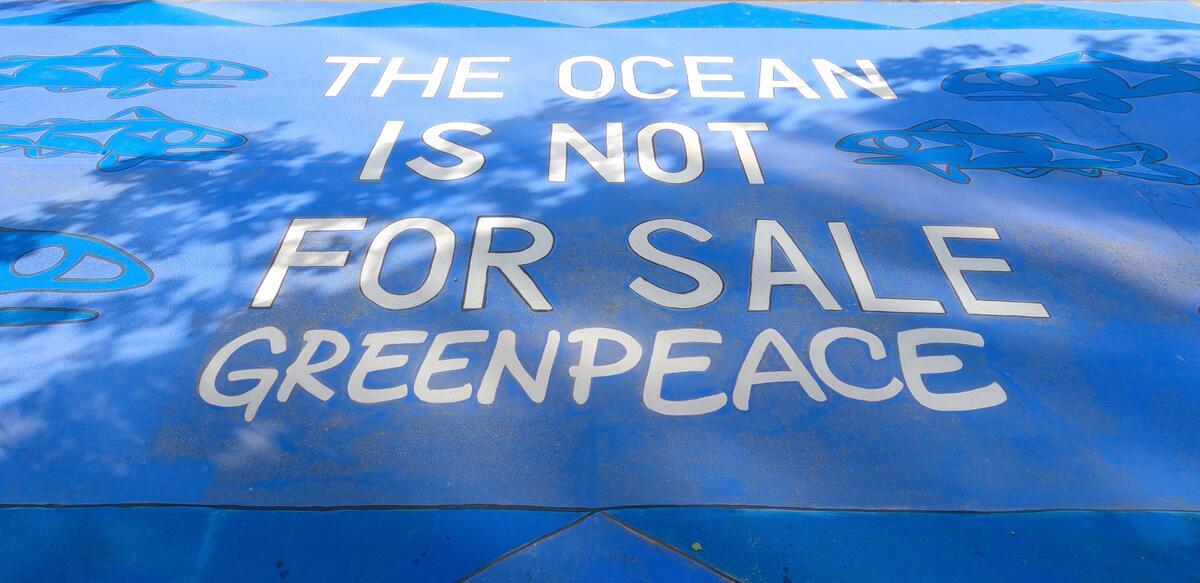Ahoy, ahoy! We’ve just returned from another marine investigation, this time on the high seas of the North Pacific Ocean.
From aboard our Greenpeace ship, Rainbow Warrior, we concluded a five-week expedition documenting the destructive fishing practices around the Emperor Seamount. We also exposed the labor conditions on Taiwanese longlining vessels — the most prevalent fleet that fish these waters.
A vast chain of underwater mountains, the Emperor Seamounts are surrounded by water columns which are enjoyed by tuna, along with blue, sperm and humpback whales. The seabed below is home to a variety of coral and sponges, and various seabirds — like the ancient Albatross — fill the skies above.
“The Emperor Seamounts are a remarkable biological hotspot, teeming with life,” explains Helena Pirhonen, Fundraising Lead on the Greenpeace International Oceans are Life campaign. “Unfortunately, this is exactly why they have been targeted heavily by industrial fishing. They need to be protected to allow life there to recover.”
This area should be a top priority for ocean protection under the new Global Ocean Treaty, because it’s threatened by illegal, unreported and unregulated fishing. To help make our case for its protection, we monitored and interacted with nine fishing vessels from a safe distance, and documented their longline hauls.
Longlines are 100km long fishing lines attached to floats which are dragged behind fishing vessels. These longlines lead to significant “bycatch” — ensnaring turtles, seabirds, and sharks in their wake.
Over 25 hours, we recorded 84 sharks being hauled from the ocean from these longlines — that’s a rate of three sharks per hour. The sharks were either dead or killed thereafter, with no regard for their age or endangered status. As my colleague Vela Andapita described it, these catches were “more shark than tuna.”
One haul we recorded saw countless (well, we counted them: over 935) empty hooks, one young tuna fish, and 16 sharks. These numbers reflect the emptying of our oceans from overfishing, despite what big business may claim about healthy tuna stocks in the Pacific.
But harmful fishing practices don’t just take place in the water. Fishers aboard these vessels are often stranded at sea for months or even years at a time, working in difficult, sometimes severe, conditions — and cut off from their friends and family at home on land.
Over the last few years, we’ve collaborated with the Indonesian Migrant Workers Union (SBMI) — which frequently receives complaints from Indonesian migrant fishers — to investigate the forced labour and illegal fishing practices on distant-water fishing vessels.
So, with permission from the ship’s captains, we approached the Taiwanese longliners from our inflatable dinghies and offered the fishers packages of coffee, soap, Indonesian noodles, and more. We also shared our Wi-Fi from the Rainbow Warrior, so they could contact their loved ones at home. Once the Wi-Fi was up, almost all the fishers grabbed their phones to call home for the first time since they left land two to three months prior.
© Myrthe Verweij / Greenpeace. Crew onboard the Rainbow Warrior in the North Pacific Ocean, display a net banner reading “FREE WIFI”. The wifi will be offered to fishers onboard longline fishing vessels.
Along with urging governments to ratify the Global Ocean Treaty by 2025, and specifically protect these seamounts, we’ll continue to advocate for the rights of fishers at sea. Because these destructive practices do not just exploit marine ecosystems, they harm people as well.
If you’d like to learn more about this investigation follow this link.



Discussion
Great investigative journalism. thank you for keeping our eyes on these horrors
This planet and its being livings need people like everyone in Greenpeace to survive. Your devotion and commitment are amazing! Thank you!
More confirmation of the great work Green Peace is doing. Glad to be a supporter.